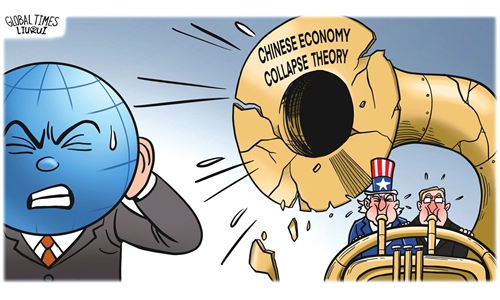Graphic: Global Times
China posted a GDP growth of 5.2 percent for 2023 on Wednesday, successfully meeting last year's annual target and in line with market forecast.
The world's second-largest economy is now at 126 trillion yuan ($17.67 trillion) and an official with the National Bureau of Statistics (NBS) projected that China was the world's largest growth engine for the past year.
In the fourth quarter of 2023, China's GDP expanded 5.2 percent.
The NBS data came after Chinese Premier Li Qiang made a revelation of the 5.2-percent GDP growth for 2023 during a speech at the World Economic Forum annual meeting in Davos on Tuesday.
At Davos, Li called for global cooperation in various areas to rebuild global trust, including strengthening macroeconomic policy coordination and international industrial specialization and cooperation, warning that lack of trust and fragmentation will risk global economic growth and peaceful development.
Chinese analysts said the GDP reading showed that China's economy has achieved a remarkably steady growth and emerged from the shadows of the pandemic over the past 12 months, despite factors including a slowdown in the real estate industry.
Standout achievements include vibrant services sector spending, substantial investments in high-end manufacturing, and notable progress in foreign trade activities. These compelling data refute the continuous attempts by certain foreign media outlets to paint a negative picture of China's economic recovery, they noted.
The data highlight the strong internal dynamics of the Chinese economy and its significant potential for continuous expansion, even amid a turbulent international macroeconomic environment, continuing to drive global resurgence, said analysts.
"Facing complex international environment and arduous tasks of domestic reform and development in 2023, the Chinese economy witnessed the momentum of recovery, supply and demand improved, transformation and upgrades advanced solidly … And major expected targets were achieved," Kang Yi, head of NBS, told a State Council Information Office press conference on Wednesday.
China's 5.2-percent growth in 2023 far exceeded an estimated average of 3-percent growth of the world economy. Contribution of the Chinese economy to the world economy is expected to exceed 30 percent with China becoming the largest growth engine of global growth, Kang said, noting that the increase of China's GDP in 2023, at more than 6 trillion yuan, equals to the whole year GDP of a medium-sized country.
Specifically, whole-year value-added of the industrial enterprises above designated size went up 4.6 percent year-on-year, retail sales of consumer goods were up 7.2 percent, and fixed-asset investment edged up by 3.0 percent.
Looking ahead, the NBS chief said, "we must be aware that the external environment is increasingly complex, severe and uncertain, and the economic growth is still facing difficulties and challenges."
Analysts interviewed by the Global Times said the government will need to tackle a number of issues including ultra-low inflation and a weak property sector in 2024, while calling for the rolling out of more pro-growth stimulus.
Cao Heping, an economist at Peking University, told the Global Times on Wednesday that the fact that the Chinese economy can achieve a 5.2-percent growth rate under the severe conditions last year is a proof that the Chinese economy has firmly set its foot on the track of new economy, which is powered by digital technologies.
Zhou Maohua, a macroeconomic analyst at Everbright Bank, told the Global Times on Wednesday that there are certain fluctuations in the recovery trajectory in 2023, suggesting uneven recovery. "More efforts are needed to restore the full vigor of the economy."
China's recovering industrial sector faces uncertainty of overseas demand, spillover effects of geopolitical conflicts and the reshaping of global industrial and supply chain, Zhou noted.
Hu Qimu, deputy secretary-general of the digital-real economies integration Forum 50, told the Global Times on Wednesday that the government needs to spend more efforts to bolster up prices of goods, as a continued softening of consumer prices will hurt expectations.
NBS' Kang responded to a media question at the conference, saying the streak of Consumer Price Index declines seen in recent months is mainly driven by structural and periodical factors, noting the CPI in 2024 is expected to rebound mildly.
Positive factors
NBS' Kang said the Chinese economy is expected to continue on a recovery track and faces more opportunities than challenges in 2024 as factors supporting the high-quality development of the Chinese economy are converging. Recently, international organizations including the IMF and the OECD have revised China's growth projections in 2024.
Experts pointed out that the Chinese economy has demonstrated remarkable resilience in 2023 and they noted that the Chinese economy will continue to forge ahead in 2024 despite global challenges as China has room to intensify policies aimed at driving economic growth.
Xing Zhaopeng, senior China strategist with ANZ Research, said China is expected to set a GDP growth target of 5 percent for 2024 and "potential growth should still be above 5 percent."
"We expect China will roll out strong measures to guide the green consumption and investment, to help offload the excess supplies in the economy," Xing told the Global Times on Wednesday.
Yu Yongding, academic advisor to the CF40 and Member of the Chinese Academy of Social Sciences, also said in a recent signed article that "In my opinion, the economic growth target for China in 2024 should not be lower than 5 percent."
"In 2024, we expect China's economy to grow by around 5 percent, which would be very impressive," Li Daokui, director of Tsinghua University's Academic Center for Chinese Economic Practice and Thinking (ACCEPT), said at a recent forum.
"On the positive side, consumption of goods will continue to expand as the lingering effect of the pandemic fades further away in 2024 and employment and resident income continue to improve, resulting in further lifting up of consumer confidence," Zhou said. "The property market is set to stabilize with the implementation of the government's supportive policies, and this will bring recoveries to related industries."
As the new year begins, efforts are being made to achieve a robust economic start all over the country.
Thousands of key projects saw construction begin in a number of localities including East China's Jiangsu Province, South China' Guangdong Province, Shanghai, Northwest China's Shaanxi Province, focusing in the field of new economy, high-end manufacturing, infrastructure and urban improvement, the Economic Daily reported on Monday.
According to a report from the Chinese Academy of Sciences Center for Forecasting Science, China's economy will maintain a stable growth in 2024, with forecasted GDP growth hitting 5.3 percent.
China's 5.2% growth encouragement for global economic recovery: Global Times editorial
China's National Bureau of Statistics on Wednesday released a series of key data on China's economy for the year 2023. Among them, the most attention-grabbing is the year-on-year GDP growth of 5.2 percent, which is higher than the expected target set at the beginning of last year. Once again, the actual trajectory of China's economy stands out from some external pessimistic views, criticisms, and even collapse theories, demonstrating robust resilience and potential. According to estimates based on the World Bank's predictions for growth rates of major economies in 2023, China's economic increment is approximately 1.5 times that of the US and around 16.5 times that of the Eurozone. China's contribution to global economic growth is greater than the combined contributions of the Americas, Europe, and Japan, making it a leading engine for global economic growth.
From the reports and commentaries of various domestic and international media, it is evident that this figure is generally in line with, or even exceeds, market expectations. To be frank, the Chinese economy's recovery in 2023 was not entirely smooth. The impact of the pandemic's "scar effect" on the economy was larger than anticipated, with the real estate sector persistently sluggish. Simultaneously, the weak global economic recovery exerted pressure on trade growth, and the spillover effects of actions such as the Federal Reserve's interest rate hikes and the appreciation of the US dollar shouldn't be underestimated. The public, to varying degrees, have experienced the impacts of these domestic and external challenges in their micro-level perceptions over the past year.
There were once even voices of "deflation" in public opinion, and opportunistic individuals outside even seized the opportunity to chant the "collapse of the Chinese economy." Achieving such results in this context is undoubtedly of positive significance. It not only plays a constructive role in allowing both domestic and international observers to gain a timely and clear understanding of the overall picture of the Chinese economy but also serves as the best refutation of the various unfounded theories and speculations about the Chinese economy. Furthermore, it provides a strong encouragement amid the generally lower expectations for global economic recovery this year.
In fact, based on various data released by the National Bureau of Statistics, it is evident that China's economy underwent an accelerated transformation last year. First, the traditional "three engines" that drive the economy - exports, consumption, and investment - are undergoing significant changes in their contribution to economic growth. In 2023, the contribution rate of domestic demand, represented by consumption and investment, to economic growth reached 111.4 percent, an increase of 25.3 percentage points on the previous 12 months. However, there is also a problem of insufficient effective demand, and the combination of supply-side structural reform and expanding effective demand needs further strengthening.
Second, the structural adjustment and transformation and upgrading of economic development have been accelerating. In 2023, more than 1 trillion yuan ($140 billion) worth of "new three items," namely electric vehicles, solar panels, and lithium batteries, have been exported, with investments in high-tech manufacturing and high-tech services growing by 9.9 percent and 11.4 percent respectively. However, we have also seen that the potential of high-tech industries to drive the national economy has not been fully realized yet.
It should be said that it is precisely in the complex and diverse process of China's economic changes that various observations and feelings have been formed. However, for a super-large-scale economy like China, and a big ship like the Chinese economy, the most important thing is to determine if it is sailing in the right direction. In the process of the aforementioned economic development, we have already witnessed the strong potential of moving toward high-quality development. This is why the 5.2 percent figure represents the confidence that the Chinese economy can navigate the challenges this year. Now, the key is to release this potential with sufficient patience and redoubled efforts, and smoothly achieve the transformation and upgrading of the economic structure.
It can be foreseen that 2024 will also not be a smooth journey, as competition among various forces will intensify. However, what's certain is that in the context of the global economic growth expected to slow down, the continuous rise of geopolitical risks, the onset of a super innovation cycle, and the acceleration of global green transformation, China's overall macroeconomic and policy direction is the clearest and most stable among all major economies. We will seek new growth driving factors through tech innovation, transformation and upgrading, continuously increasing investment in areas such as digital economy, artificial intelligence development, and green technology, while continuing to exert the policy effects of stabilizing growth. The resilient Chinese economy will provide the world with certainty and stability.
China's economy ended 2023 on a positive note, recording a year-on-year GDP growth of 5.2 percent and surpassing the set targe
The 5.2 percent growth figure for China's economy in 2023 is a strong number, given the size of the Chinese economy, its state of development and the weak outlook for global growth. I sharply disagree with critics who say the Chinese economy is stumbling.
China's consumption in 2023 played a vital role in bolstering economic development. Final consumption contributed 82.5 percent of overall GDP growth, while retail sales set a new record of 47.15 trillion yuan ($6.62 trillion), data from the National Bureau of Statistics (NBS) showed on Wednesday.
China should set an economic growth target of 5 percent or above for 2024, as the global economy is projected to slow this year.









No comments:
Post a Comment
rightwaystosuccess@gmail.com